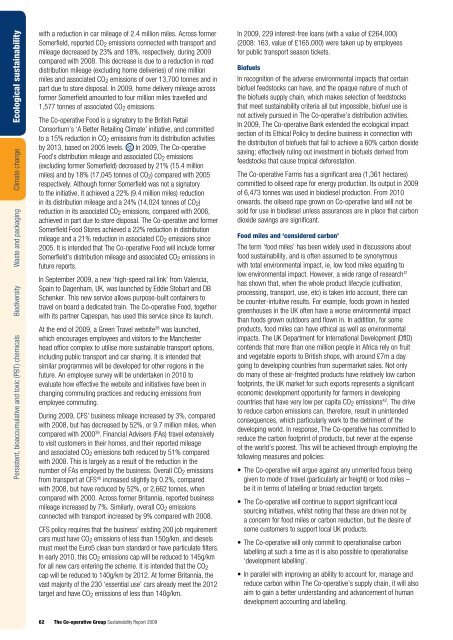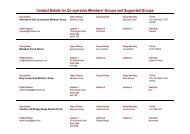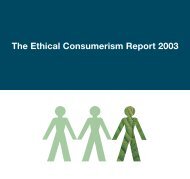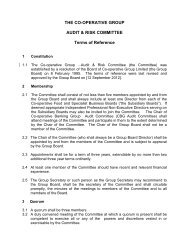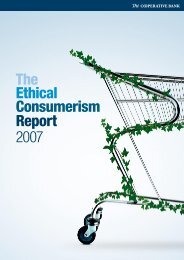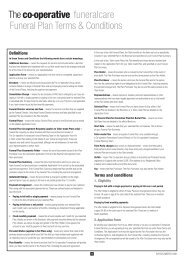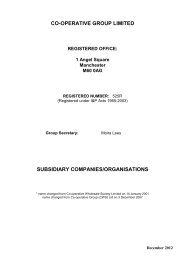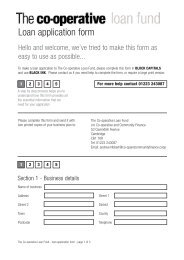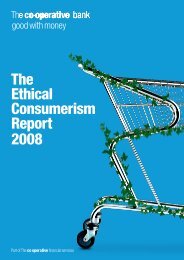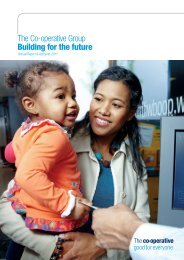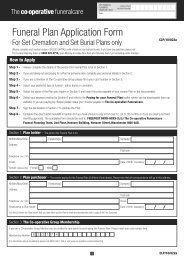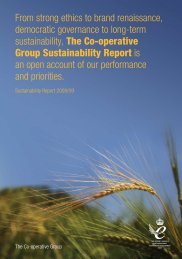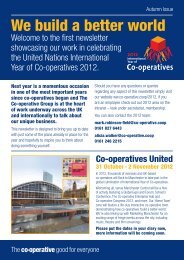Sustainability Report 2009 - The Co-operative
Sustainability Report 2009 - The Co-operative
Sustainability Report 2009 - The Co-operative
You also want an ePaper? Increase the reach of your titles
YUMPU automatically turns print PDFs into web optimized ePapers that Google loves.
Persistent, bioaccumulative and toxic (PBT) chemicals Biodiversity Waste and packaging Climate change Ecological sustainability<br />
with a reduction in car mileage of 2.4 million miles. Across former<br />
Somerfield, reported CO 2 emissions connected with transport and<br />
mileage decreased by 23% and 18%, respectively, during <strong>2009</strong><br />
compared with 2008. This decrease is due to a reduction in road<br />
distribution mileage (excluding home deliveries) of nine million<br />
miles and associated CO 2 emissions of over 13,700 tonnes and in<br />
part due to store disposal. In <strong>2009</strong>, home delivery mileage across<br />
former Somerfield amounted to four million miles travelled and<br />
1,577 tonnes of associated CO 2 emissions.<br />
<strong>The</strong> <strong>Co</strong>-<strong>operative</strong> Food is a signatory to the British Retail<br />
<strong>Co</strong>nsortium’s ‘A Better Retailing Climate’ initiative, and committed<br />
to a 15% reduction in CO 2 emissions from its distribution activities<br />
by 2013, based on 2005 levels. In <strong>2009</strong>, <strong>The</strong> <strong>Co</strong>-<strong>operative</strong><br />
Food’s distribution mileage and associated CO 2 emissions<br />
(excluding former Somerfield) decreased by 21% (15.4 million<br />
miles) and by 18% (17,045 tonnes of CO 2 ) compared with 2005<br />
respectively. Although former Somerfield was not a signatory<br />
to the initiative, it achieved a 22% (9.4 million miles) reduction<br />
in its distribution mileage and a 24% (14,024 tonnes of CO 2 )<br />
reduction in its associated CO 2 emissions, compared with 2006,<br />
achieved in part due to store disposal. <strong>The</strong> <strong>Co</strong>-<strong>operative</strong> and former<br />
Somerfield Food Stores achieved a 22% reduction in distribution<br />
mileage and a 21% reduction in associated CO 2 emissions since<br />
2005. It is intended that <strong>The</strong> <strong>Co</strong>-<strong>operative</strong> Food will include former<br />
Somerfield’s distribution mileage and associated CO 2 emissions in<br />
future reports.<br />
In September <strong>2009</strong>, a new ‘high-speed rail link’ from Valencia,<br />
Spain to Dagenham, UK, was launched by Eddie Stobart and DB<br />
Schenker. This new service allows purpose-built containers to<br />
travel on board a dedicated train. <strong>The</strong> <strong>Co</strong>-<strong>operative</strong> Food, together<br />
with its partner Capespan, has used this service since its launch.<br />
At the end of <strong>2009</strong>, a Green Travel website 38 was launched,<br />
which encourages employees and visitors to the Manchester<br />
head office complex to utilise more sustainable transport options,<br />
including public transport and car sharing. It is intended that<br />
similar programmes will be developed for other regions in the<br />
future. An employee survey will be undertaken in 2010 to<br />
evaluate how effective the website and initiatives have been in<br />
changing commuting practices and reducing emissions from<br />
employee commuting.<br />
During <strong>2009</strong>, CFS’ business mileage increased by 3%, compared<br />
with 2008, but has decreased by 52%, or 9.7 million miles, when<br />
compared with 2000 39 . Financial Advisers (FAs) travel extensively<br />
to visit customers in their homes, and their reported mileage<br />
and associated CO 2 emissions both reduced by 51% compared<br />
with 2008. This is largely as a result of the reduction in the<br />
number of FAs employed by the business. Overall CO 2 emissions<br />
from transport at CFS 40 increased slightly by 0.2%, compared<br />
with 2008, but have reduced by 52%, or 2,662 tonnes, when<br />
compared with 2000. Across former Britannia, reported business<br />
mileage increased by 7%. Similarly, overall CO 2 emissions<br />
connected with transport increased by 9% compared with 2008.<br />
CFS policy requires that the business’ existing 200 job requirement<br />
cars must have CO 2 emissions of less than 150g/km, and diesels<br />
must meet the Euro5 clean burn standard or have particulate filters.<br />
In early 2010, this CO 2 emissions cap will be reduced to 145g/km<br />
for all new cars entering the scheme. It is intended that the CO 2<br />
cap will be reduced to 140g/km by 2012. At former Britannia, the<br />
vast majority of the 230 ‘essential use’ cars already meet the 2012<br />
target and have CO 2 emissions of less than 140g/km.<br />
In <strong>2009</strong>, 229 interest-free loans (with a value of £264,000)<br />
(2008: 163, value of £165,000) were taken up by employees<br />
for public transport season tickets.<br />
Biofuels<br />
In recognition of the adverse environmental impacts that certain<br />
biofuel feedstocks can have, and the opaque nature of much of<br />
the biofuels supply chain, which makes selection of feedstocks<br />
that meet sustainability criteria all but impossible, biofuel use is<br />
not actively pursued in <strong>The</strong> <strong>Co</strong>-<strong>operative</strong>’s distribution activities.<br />
In <strong>2009</strong>, <strong>The</strong> <strong>Co</strong>-<strong>operative</strong> Bank extended the ecological impact<br />
section of its Ethical Policy to decline business in connection with<br />
the distribution of biofuels that fail to achieve a 60% carbon dioxide<br />
saving; effectively ruling out investment in biofuels derived from<br />
feedstocks that cause tropical deforestation.<br />
<strong>The</strong> <strong>Co</strong>-<strong>operative</strong> Farms has a significant area (1,361 hectares)<br />
committed to oilseed rape for energy production. Its output in <strong>2009</strong><br />
of 6,473 tonnes was used in biodiesel production. From 2010<br />
onwards, the oilseed rape grown on <strong>Co</strong>-<strong>operative</strong> land will not be<br />
sold for use in biodiesel unless assurances are in place that carbon<br />
dioxide savings are significant.<br />
Food miles and ‘considered carbon’<br />
<strong>The</strong> term ‘food miles’ has been widely used in discussions about<br />
food sustainability, and is often assumed to be synonymous<br />
with total environmental impact, ie, low food miles equating to<br />
low environmental impact. However, a wide range of research 41<br />
has shown that, when the whole product lifecycle (cultivation,<br />
processing, transport, use, etc) is taken into account, there can<br />
be counter-intuitive results. For example, foods grown in heated<br />
greenhouses in the UK often have a worse environmental impact<br />
than foods grown outdoors and flown in. In addition, for some<br />
products, food miles can have ethical as well as environmental<br />
impacts. <strong>The</strong> UK Department for International Development (DfID)<br />
contends that more than one million people in Africa rely on fruit<br />
and vegetable exports to British shops, with around £7m a day<br />
going to developing countries from supermarket sales. Not only<br />
do many of these air-freighted products have relatively low carbon<br />
footprints, the UK market for such exports represents a significant<br />
economic development opportunity for farmers in developing<br />
countries that have very low per capita CO 2 emissions 42 . <strong>The</strong> drive<br />
to reduce carbon emissions can, therefore, result in unintended<br />
consequences, which particularly work to the detriment of the<br />
developing world. In response, <strong>The</strong> <strong>Co</strong>-<strong>operative</strong> has committed to<br />
reduce the carbon footprint of products, but never at the expense<br />
of the world’s poorest. This will be achieved through employing the<br />
following measures and policies:<br />
• <strong>The</strong> <strong>Co</strong>-<strong>operative</strong> will argue against any unmerited focus being<br />
given to mode of travel (particularly air freight) or food miles –<br />
be it in terms of labelling or broad reduction targets.<br />
• <strong>The</strong> <strong>Co</strong>-<strong>operative</strong> will continue to support significant local<br />
sourcing initiatives, whilst noting that these are driven not by<br />
a concern for food miles or carbon reduction, but the desire of<br />
some customers to support local UK products.<br />
• <strong>The</strong> <strong>Co</strong>-<strong>operative</strong> will only commit to operationalise carbon<br />
labelling at such a time as it is also possible to operationalise<br />
‘development labelling’.<br />
• In parallel with improving an ability to account for, manage and<br />
reduce carbon within <strong>The</strong> <strong>Co</strong>-<strong>operative</strong>’s supply chain, it will also<br />
aim to gain a better understanding and advancement of human<br />
development accounting and labelling.<br />
62<br />
<strong>The</strong> <strong>Co</strong>-<strong>operative</strong> Group <strong>Sustainability</strong> <strong>Report</strong> <strong>2009</strong>


